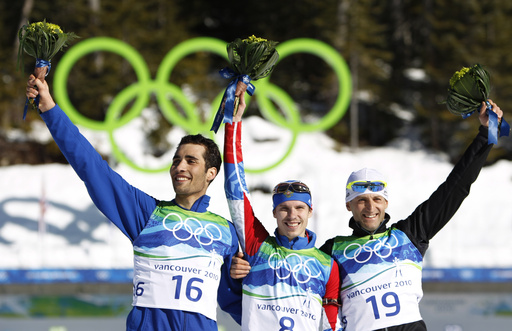
In Lausanne, Switzerland, a decision from the Court of Arbitration for Sport (CAS) is poised to change the medal standings from the 2010 Vancouver Winter Olympics significantly, particularly benefiting French biathlon athlete Martin Fourcade. The International Biathlon Union announced on Tuesday that a previous appeal lodged by Russian biathlete Evgeny Ustyugov had been dismissed, paving the way for Fourcade to receive a gold medal in the 15-kilometer mass start event where Ustyugov had initially finished first.
Ustyugov had contested a ruling from October 2020 by a CAS tribunal that found him guilty of blood doping, which was uncovered through his biological passport. The judges upheld this verdict, resulting in a four-year ban for Ustyugov and disqualifying all his results dating back from January 2010 until the conclusion of the 2014 season. This also affects a bronze medal he won as part of the Russian team in the men’s relay during the Vancouver Games.
Although Ustyugov has the option to appeal this decision in the Swiss supreme court, the International Olympic Committee’s (IOC) executive board is now likely responsible for reallocating the medals from the 2010 Games. As a result of this ruling, Martin Fourcade is expected to be awarded the gold medal, while Slovakia’s Pavol Hurajt is set to receive the silver, and Christoph Sumann from Austria is anticipated to be upgraded to bronze. These medal reallocations may be officially presented during the upcoming 2026 Milan-Cortina d’Ampezzo Olympics.
Fourcade’s silver medal from Vancouver was just the beginning of an illustrious Olympic career that later included seven total medals, comprising two golds at the 2014 Sochi Games and three additional golds at the 2018 Pyeongchang Olympics, including the same 15-kilometer mass start event. Following his competitive career, Fourcade has shifted focus to Olympic governance, having been elected as a member of the IOC by fellow athletes in 2022. He is actively involved in organizing the 2024 Paris Olympics and is anticipated to play a significant role in the planning of the 2030 Winter Games set to take place in the French Alps and Nice.
Now 39 years old, Ustyugov is retired from competitive racing but remains engaged in legal disputes regarding previous doping penalties. He has launched an appeal with the Swiss Federal Tribunal against a different CAS ruling from February 2020, which disqualified his results from the 2014 Sochi Olympics. Ustyugov was a key member of the Russian men’s relay team that clinched gold in their home Winter Games, outpacing competitors from Germany, Austria, and Norway. However, the IOC has yet to resolve the matter of reallocating those specific medals.
The doping findings that formed the basis for Ustyugov’s disqualifications were derived from data obtained from the Moscow testing laboratory, which was implicated in the broader Russian state-sponsored doping scandal that marred the Sochi Olympics and other international sporting events.
